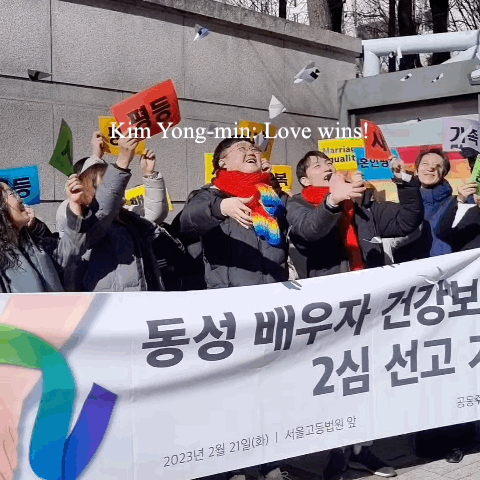February 22, 2023
SEOUL – A South Korean high court ruled on Tuesday that the spouse in a same-sex partnership is eligible for national health insurance coverage under his partner’s subscription.
The landmark ruling overturns a lower court’s decision in January 2022 that rejected the same-sex couple’s petition to cancel the National Health Insurance Service’s decision to demand back-payments from the non-earning partner.
A spouse without a source of income is exempted from making a health insurance contribution if the other person is employed and is an employer-provided policyholder.
As the lower court did not recognize the couple’s marriage, stating that marriage is a union only between a man and woman, both spouses had been subject to paying their contributions separately.
“The lower court ruling has been overturned. Contributions imposed on (a spouse) are revoked, and (the NHIS) is responsible for payment of attorney fees of both the plaintiff and the defendant,” a Seoul High Court judge said briefly.
“The plaintiff and his partner are both male, but they agreed to recognize each other as loving partners who take care of each other. One financially relies on the other. They declared their partnership before their families and friends. This makes their relationship no different in essence from that of a married couple,” read the ruling.
The court said the ruling is the first in the country that recognizes the status of a same-sex partner as a dependent eligible for national health insurance, but said that this did not mean that it recognizes the “legal status” of a same-sex marriage.
However, the couple — So Sung-uk and Kim Yong-min — shed tears, saying that their status as a same-sex couple had been recognized within the boundary of the country’s legal system.
“I feel delighted because I felt like the judges told us through this court decision that my feelings of love for my husband shall not be a target of curse, ignorance or insult,” So told reporters after the ruling.
“I can say with confidence that love wins, and discrimination or hate do not.”

So Sung-uk (left) and Kim Yong-min tear into pieces card signs with “discrimination” written on them and throw them in the air as they celebrate a high court ruling Tuesday. (Son Ji-hyoung/The Korea Herald)
The two had known each other for 10 years and lived together since 2013. They held a wedding ceremony in Korea in May 2019, but did not legally register the marriage as Korean law does not allow the registration of same-sex couples.
Kim and So registered as a national health insurance policyholder and dependent in February 2020. Kim, 32, was employed, and So, 31, was a dependent.
Later in October 2020, the NHIS imposed a fee of 115,560 won ($89) on So, saying his marital status was not validand that he was responsible for eight months’ worth of belated premium payments. The NHIS unilaterally deprived the dependent of his status, and of his opportunity to express his opinion about the notification, which the court saw as “a discriminatory act.”
So filed an administrative complaint against the NHIS in February 2021.
“It took us such a long time to have our marriage status recognized within the legal framework,” Kim said, adding, “The right we’ve obtained is 1 out of 1,000 that a married couple has had.”
Attorney Park Han-hee, a legal representative of the couple, said the landmark court decision could set a precedent to prevent discrimination against sexual minorities.
“This court ruling is not just about individuals fighting over insurance payments. Instead, I hope the ruling can set a precedent that discourages the state from hindering same-sex couples’ rights,” said Park, who herself identifies as transgender.
In previous trials, Korean courts have not put same-sex couples on par with heterosexual couples.
For example, in 2004, a district court ruling in Incheon dismissed a claim for alimony from a same-sex couple who had broken up after living together for decades. Another appeal court ruling in 2016 in Seoul indicated that the marriage of a same-sex couple cannot be registered in Korea.


